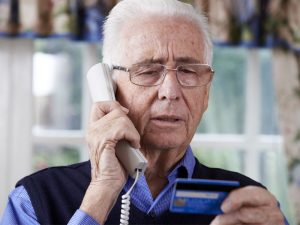This article originally published in the Winston-Salem Journal
 CATEGORIES: Elder Law, Elder Care Attorney, Senior Safety
CATEGORIES: Elder Law, Elder Care Attorney, Senior Safety
Identity theft is scary. Charlie, a 72-year-old retiree, hears the first ring while heating up the spaghetti sauce for dinner. He thought about letting the phone go, but something about the ring telegraphed urgency.
The caller sounded excited, as he spoke in a Hispanic accent: “Congratulations! You have won the lottery!” “What lottery?” Charlie asks. The caller explained further: In order to improve its economy, Portugal, in 2011, established an international lottery, and you are one of the 2016 winners. “Congratulations Charlie, you have won $383,000.00!”
Charlie has not won much in his life, and has grown a bit tired of living on a fixed income. He is just the type of target that the swindler was hoping for–the type of mark willing to believe that big money might drop into his lap one day, just like that, money for nothing!
The Forsyth County Sheriff’s Department reports that the swindlers who conduct such telephone scams understand human nature, mostly targeting seniors who may have more difficulty recognizing predators, and who may be receptive to receiving a promise of money. Calls are intentionally made at busy times of day, such as dinner time, because it is easier for crooks to swindle people when they are distracted.
Such come-ons as the one above are like money in the bank for crooks–they set up “boiler rooms” with lots of experienced callers in both foreign countries and the U.S. Connecting with every few calls, their schemes work reliably and predictably, day in and day out. And, just like portrayed in the movie “The Sting,” the swindlers close up shop and move elsewhere every few days, which makes them incredibly hard for the authorities to catch.
As reported by the Forsyth County Sheriff’s Department, telephone scams such as the one above frequently lead to identity theft. The swindler’s call may continue like this:
The caller explains to Charlie that nothing will be required of him to receive his $383,000.00, except filling out a few forms. The caller asks for Charlie’s address, which Charlie gives him, so that Charlie can fill out a 7-page Acceptance Document which will be Federal Expressed to him. The caller promises Charlie that once he fills out the form and sends it back, his $383,000.00 will be on its way!
The next day, Charlie receives the 7-page document as promised. The document contains blanks for Charlie to fill in the following type of information:
- Charlie’s full name;
- Charlie’s wife’s full name, and her maiden name (if Charlie is married);
- The last 3 addresses where Charlie has lived;
- Information about Charlie’s current and previous automobiles, and where they were financed;
- Detailed name and contact information about Charlie and his wife’s physicians.
The cover letter accompanying the 7-page document that Charlie received explains that he will be receiving his $383,000.00 prize money via wire transfer, thus the Lottery Prize board will need Charlie to fill in the following information so that they can wire him the money:
- Charlie’s Social Security number;
- Charlie’s bank account numbers and accompanying passwords.
Of course, once Charlie returns the form, his and his wife’s identities have been stolen.
As an estate planning attorney, one of my jobs is to assist seniors and others with keeping their money, so they will have enough during life, and pass it down to their beneficiaries as they wish. It’s important for seniors and their caregivers to understand the risk of such telephone scams, because such telephone identity theft schemes are prevalent in the Piedmont Triad, and they keep working. A public educator for the Forsyth County Sheriff’s Department reports that when he warns seniors in his talks about the above identity theft telephone scam, he frequently meets Forsyth County seniors who have already become victims.
The Forsyth County Sheriff’s Department shares the following advice with seniors regarding telephone calls from strangers:
- Remember what Mama told you: Nobody ever gives you something for nothing;
- Never promise or agree to give money to anybody over the telephone;
- Never give out any personal information over the telephone;
- If a caller’s story seems too good to be true, it is not true;
- The best defense to a telephone scam is to hang up the telephone, quickly!
